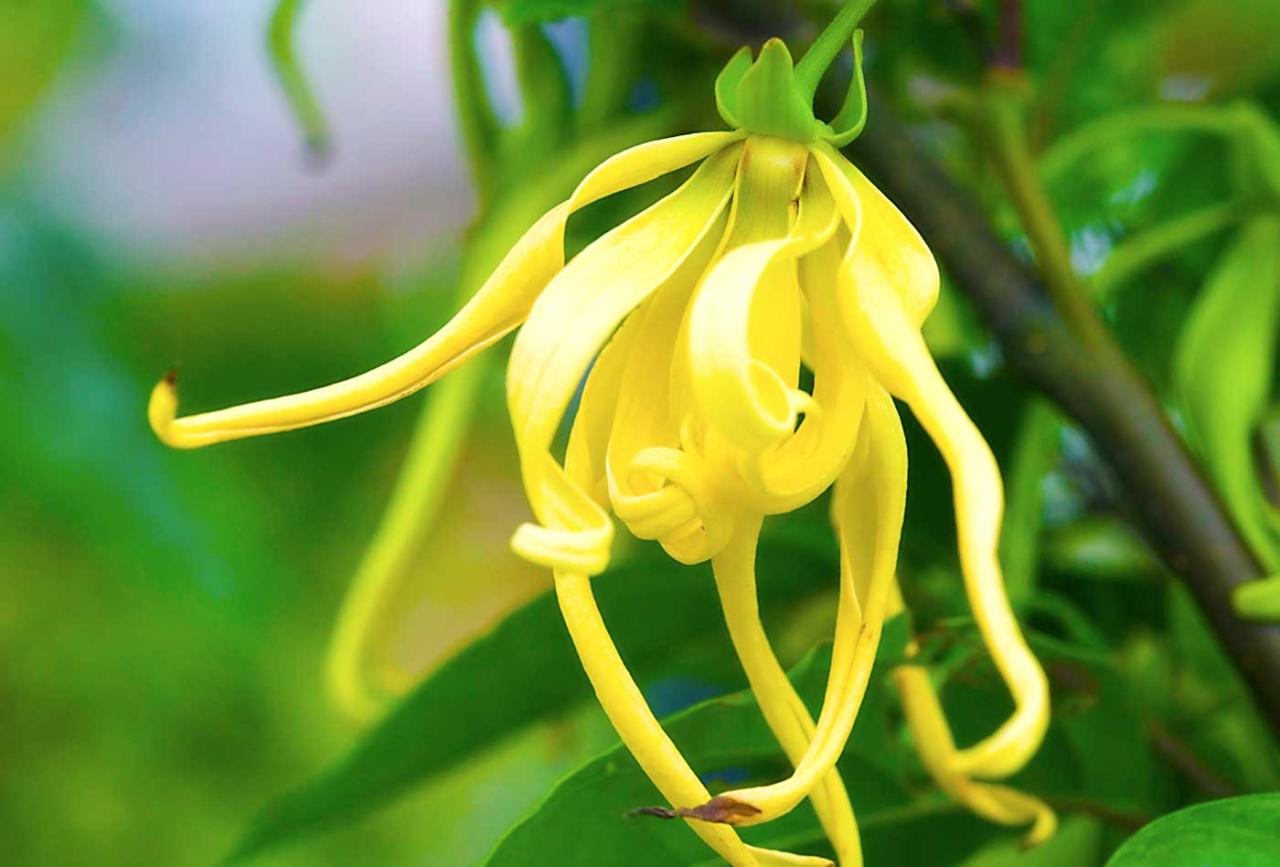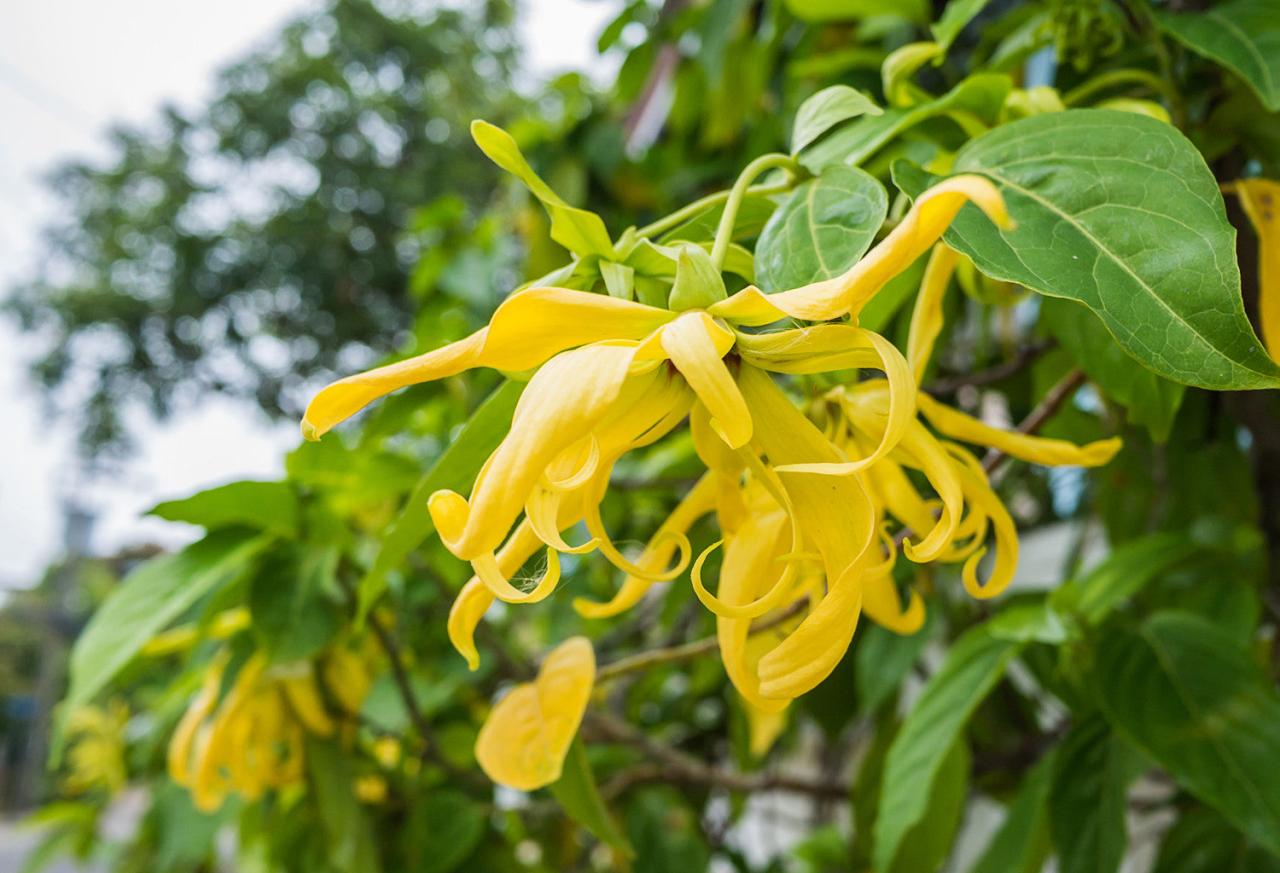Embark on an aromatic journey as we delve into the captivating world of tropical flowers and their enchanting role in aromatherapy. From their alluring scents to their therapeutic properties, these floral treasures hold the key to unlocking relaxation, rejuvenation, and well-being.
In this comprehensive guide, we will explore the diverse tropical flowers used in aromatherapy, their unique characteristics, and the myriad ways they can enhance our lives. Prepare to be captivated by the fragrant symphony of nature’s finest.
Popular Tropical Flowers in Aromatherapy
Tropical flowers have become increasingly popular in aromatherapy due to their captivating scents and therapeutic properties. These fragrant blooms offer a wide range of benefits, from relaxation to invigoration, making them a valuable addition to any aromatherapy practice.
Here are some of the most common tropical flowers used in aromatherapy products:
Ylang-Ylang
- Botanical name: Cananga odorata
- Scent: Sweet, floral, slightly spicy
- Therapeutic properties: Relaxing, balancing, aphrodisiac
Frangipani
- Botanical name: Plumeria
- Scent: Sweet, floral, with hints of citrus
- Therapeutic properties: Calming, soothing, uplifting
Jasmine
- Botanical name: Jasminum officinale
- Scent: Rich, sweet, intoxicating
- Therapeutic properties: Relaxing, calming, mood-boosting
Ginger Lily
- Botanical name: Hedychium coronarium
- Scent: Spicy, floral, with a hint of ginger
- Therapeutic properties: Warming, invigorating, stimulating
Lotus
- Botanical name: Nelumbo nucifera
- Scent: Sweet, floral, slightly earthy
- Therapeutic properties: Calming, soothing, spiritual
Benefits of Tropical Flowers in Aromatherapy
Tropical flowers are renowned for their captivating scents and therapeutic properties. In aromatherapy, they are harnessed to create a serene and revitalizing atmosphere, offering a myriad of benefits for both the mind and body.
One of the primary benefits of tropical flowers in aromatherapy is their calming and uplifting effects. Their sweet and exotic fragrances have a soothing impact on the nervous system, helping to alleviate stress and anxiety. By promoting relaxation and tranquility, these flowers can enhance mood and create a sense of well-being.
Promoting Relaxation and Sleep Quality
The calming properties of tropical flowers extend to their ability to promote relaxation and improve sleep quality. The soothing scents of these flowers can help to reduce tension and prepare the body for rest. Inhaling the aromas of tropical flowers before bedtime can facilitate a peaceful transition into sleep, ensuring a restful and rejuvenating night’s sleep.
Extraction Methods for Tropical Flower Oils
Extracting essential oils from tropical flowers involves various techniques, each with its advantages and disadvantages. The most common methods include steam distillation and solvent extraction.
Steam Distillation
Steam distillation is a widely used method that involves passing steam through plant material. The steam carries volatile compounds, including essential oils, which are then condensed and collected. This method is advantageous for its efficiency and ability to preserve the delicate aroma of flowers.
Examples of tropical flower oils obtained through steam distillation include:
- Ylang-ylang oil
- Frangipani oil
- Plumeria oil
Solvent Extraction
Solvent extraction utilizes organic solvents, such as ethanol or hexane, to dissolve essential oils from plant material. This method is less efficient than steam distillation but allows for the extraction of a wider range of compounds, including those that are heat-sensitive.
Examples of tropical flower oils obtained through solvent extraction include:
- Jasmine oil
- Rose oil
- Tuberose oil
Applications of Tropical Flower Oils in Aromatherapy

Tropical flower oils are highly versatile and can be used in a wide range of aromatherapy applications. Their therapeutic properties make them suitable for various purposes, from promoting relaxation and reducing stress to improving skin health and alleviating pain.
Therapeutic Applications
| Flower Name | Oil Extraction Method | Therapeutic Uses | Recommended Application Methods |
|---|---|---|---|
| Ylang-Ylang | Steam distillation | Stress relief, mood enhancement, aphrodisiac | Diffusers, massage blends, skincare products |
| Champaka | Solvent extraction | Relaxation, sleep improvement, anxiety reduction | Diffusers, massage blends, bath oils |
| Frangipani | Cold pressing | Anti-inflammatory, pain relief, muscle relaxation | Massage blends, compresses, topical application |
| Hibiscus | Maceration | Antioxidant, skin conditioning, hair growth promotion | Skincare products, hair masks, massage blends |
| Plumeria | Solvent extraction | Mood elevation, stress relief, sleep aid | Diffusers, massage blends, body scrubs |
These are just a few examples of the many tropical flower oils used in aromatherapy. By understanding their unique properties and applications, you can harness their therapeutic benefits to enhance your well-being.
Safety Considerations for Using Tropical Flower Oils

Tropical flower oils, while generally safe, can pose potential risks if not used properly. It’s crucial to understand the safety considerations associated with their use to avoid adverse effects.
Dilution is essential to minimize skin irritation and allergic reactions. Tropical flower oils are highly concentrated and can cause irritation if applied directly to the skin. Always dilute them in a carrier oil, such as jojoba or coconut oil, before applying them topically.
Proper Application Methods
Apply diluted tropical flower oils to a small area of skin first to test for any allergic reactions. Wait 24 hours to observe the reaction before applying it more widely. Avoid contact with eyes and mucous membranes.
Skin Irritation and Allergic Reactions
Some individuals may experience skin irritation or allergic reactions to certain tropical flower oils. Symptoms may include redness, itching, swelling, or a burning sensation. If you experience any of these reactions, discontinue use immediately and consult a healthcare professional.
Other Adverse Effects
In rare cases, tropical flower oils may cause other adverse effects, such as nausea, dizziness, or headaches. If you experience any of these symptoms, stop using the oil and seek medical attention.
By following these safety considerations, you can enjoy the benefits of tropical flower oils while minimizing the risks of adverse effects.
Conclusive Thoughts
As we conclude our aromatic adventure, we leave you with a profound appreciation for the remarkable power of tropical flowers in aromatherapy. These fragrant wonders offer a holistic approach to well-being, inviting us to connect with nature’s healing embrace. May their enchanting scents continue to soothe your senses, uplift your spirits, and inspire a life filled with tranquility and vitality.